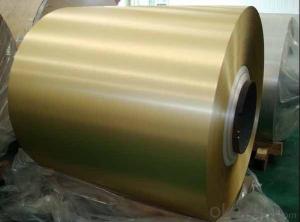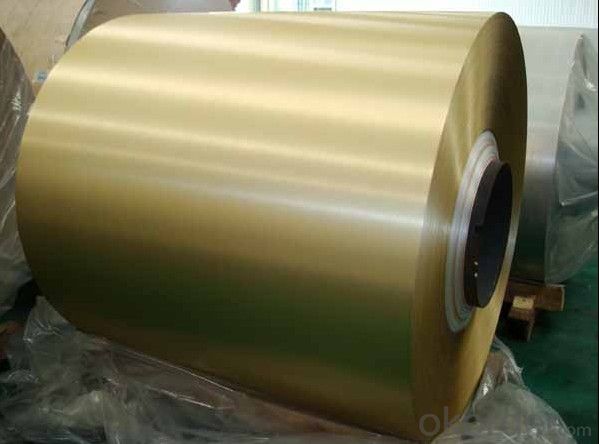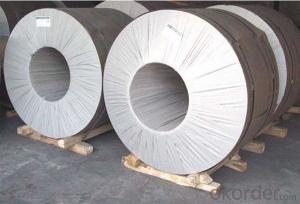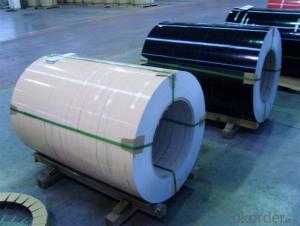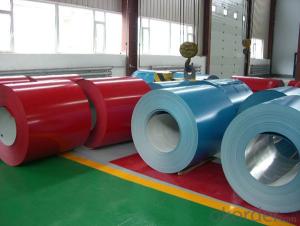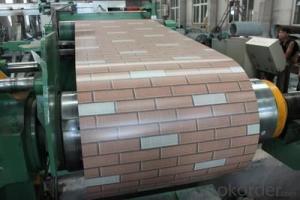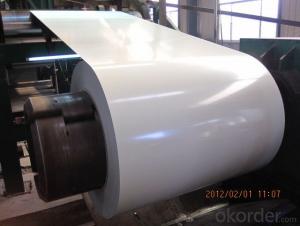Poly Aluminum Coil C83868 for Color Coated Aluminum Roll for Signs and Nameplate
- Loading Port:
- Shanghai
- Payment Terms:
- TT OR LC
- Min Order Qty:
- 3 m.t.
- Supply Capability:
- 50000 m.t./month
OKorder Service Pledge
OKorder Financial Service
You Might Also Like
Specification
Color Coated Aluminium Roll For Signs And Nameplate
Specifications
Alloy | 1050, 1060,1100, 3003 3004 3105 3A21 5005 5052 etc |
Temper | O/H12/H14/H1/H18/H32/H34/H36/H38//H111/H112/H116/H321/T6/T651/T3/T351 etc |
Thickness | 0.1mm to 6mm |
Width | 20mm to 3300mm |
Coil weight | 100kgs to 6 tons depends on actual requirement |
Core material | Aluminum or paper |
Coil inner diameter | 75mm, 150mm, 200mm, 300mm, 405mm, 505mm or as required |
Appplication | construction, roofing, decoration, lamping etc |
Package | eye to wall or eye to the wall for aluminum coil with wood pallet (wooded case also available) |
Characteristics
1) Excellent weather-proof durability
2) Anti-ultraviolet
3) High erosion resistance
4) Stable color and gloss
5) Good mechanical processing performance
6) Abrasion resistance
7) Anti-impact
8) High flexibility
Application
1) Construction material further processing
2) Solar cell frame, solar battery frame
3) Glass curtain wall frame
4) Interior decoration
5) Elevator decoration
6) Signs, nameplate, bags making.
7) Automobile parts material
8) Office and Household appliances: HVAC equipments
9) The consumer electronics: mobile phones, digital cameras, MP3 .etc.
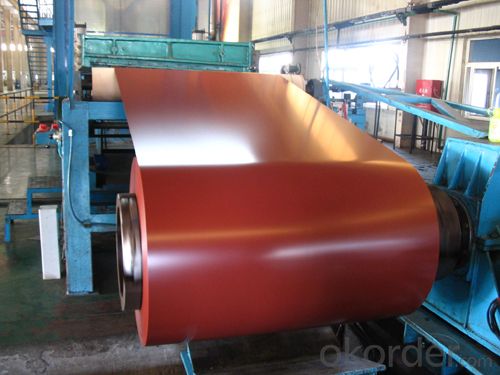
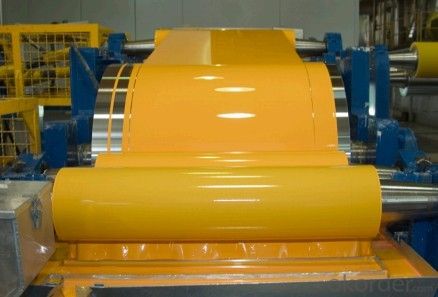
Coating varieties
Polyester Coatings (PE)
PE (polyester) coatings exhibit an excellent combination of hardness, flexibility, flow, appearance, and superior resistance to dirt retention in indoor and outdoor applications. These coatings are highly resistant to abrasion, metal marking, staining, and marring, and require minimal maintenance. Glazetech uses polyester paints which provide excellent colour and gloss retention properties.
Polyvinylidene Fluoride Coatings (PVDF)
PVDF (polyvinylidene fluoride) is a chemical resistant thick film barrier coating commonly used in architectural applications where both excellent appearance and substrate protection must be maintained over a long period of time. This coating is unaffected by most chemicals and solvents and has excellent wear and abrasion resistance. PVDF also has a high dielectric strength, excellent resistance to weathering and the ability to self extinguish.
FAQ
--Q: Do you provide free samples?
--A: Yes, free samples will be sent to you on freight at destination.
--Q: Can I get your latest products catalogue?
--A: Yes, it will be sent to you in no time.
--Q: What is the MOQ?
--A: 2 tons
--Q: What are your payment terms?
--A: We accept L/C, T/T.
--Q: What kinds of alloy can you supply?
--A: 1000 series: 1050, 1060, 1070, 1100, 1145, 1200
3000 series: 3003, 3004, 3105, 3104
5000 series: 5052, 5083, 5754, 5182
6000 series: 6061, 6063, 6062, 6063
8000 series: 8011, 8021
--Q: What’s the coating of top side?
--A: PVDF and PE coating
--Q: What kinds of temper can you supply?
--A: O-H112: O,H12,H14,H16,H18,H22,H24,H26,H,32,H34,H111,H112, T3, T4, T6
- Q: What is the thickness range of aluminum coils?
- The thickness of aluminum coils can differ depending on the particular application and industry. Generally, aluminum coils range from 0.006 to 0.25 inches (0.15 to 6.35 mm) in thickness. This wide range enables diverse uses, ranging from delicate and lightweight applications like packaging materials or electrical components to thicker coils utilized in construction or automotive sectors. It should be emphasized that these are broad ranges, and the desired thickness may vary depending on the specific use and customer requirements.
- Q: im doing this essay in my chemistry class that suppose to be a ficional story about the day my element, aluminum, slowly began disappearing.i know some things that will happen like no soda cans of anything of that, no foil no forks or spoons anything metally. i need more effects that will happen but my major problem is how to start this. i have no clue like how to begin.can anyone help pleased.!
- Aluminum has been used to replace a lot of structures that were previously made from things like steel (car frames, automobile parts, etc) since it is is much lighter. Automobiles are able to get higher gas mileage when they are made mostly from aluminum than from steel. If aluminum were to go away, it really wouldn't have any effect on everyday things like cans, utensils, etc. These things were around before aluminum was mass produced. All the utensils people have now are made from stainless steel in most cases. You've heard of tin cans? All metal food and drink containers were made from tin prior to switching over to aluminum. If you look back at the history of aluminum, it was considered more valuable than silver in the early 20th century due to the rigorous process of extracting aluminum from ore and the lack of availability.
- Q: What is the typical thickness of aluminum coils?
- The intended use and application of aluminum coils can result in varying thicknesses. Generally, a range of thicknesses is accessible, spanning from 0.006 inches (0.15 mm) to 0.25 inches (6.35 mm). The specific thickness needed for a specific project or industry hinges on factors like desired strength, flexibility, and weight of the aluminum coils.
- Q: Is it possible to utilize aluminum coils for the storage of food items?
- <p>Yes, aluminum coils can be used to store foodstuffs, particularly in the form of aluminum foil. Aluminum foil is a common food storage material due to its properties such as being lightweight, flexible, and providing a barrier against air and moisture. It is often used for wrapping food for cooking, freezing, or preserving. However, it's important to ensure that the aluminum does not react with the food, especially acidic foods, as this could lead to contamination. Additionally, it's not recommended for long-term storage as it does not provide a complete seal or barrier against all contaminants.</p>
- Q: My grandpa died from Alzheimer’s disease, I didn't know what it was but I came across something slightly disturbing. There were several blog and research sites linking Sodium Aluminum Phosphate ((you know the stuff in bisquick pancake batter stuff or maybe eggo waffles)) what bothered me is that two root words of that ingredient bothers me aluminum Phosphate ((is that like phospherous, as in phospherous paint...didn't that turn out bad to the body?)) If so maybe I need a second opinion or ensurance that it is real or not if it is I'm not eating pancakes again. Please help answer this.
- make your own pancakes and you have nothing to worry about.
- Q: What are the different grades of aluminum used in coils?
- There are several different grades of aluminum used in coils, each with its own specific properties and applications. The most commonly used grades include: 1. 1000 series: This grade of aluminum is commercially pure and has excellent corrosion resistance. It is often used in applications where high corrosion resistance is required, such as in chemical processing equipment or marine components. 2. 3000 series: These alloys are known for their moderate strength and excellent formability. They are often used in cooking utensils, heat exchangers, and general sheet metal fabrication. 3. 5000 series: This grade of aluminum is known for its excellent weldability and corrosion resistance. It is commonly used in marine environments, as well as in transportation and structural components. 4. 6000 series: These alloys are known for their combination of strength, formability, and corrosion resistance. They are widely used in architectural applications, such as window frames, doors, and curtain walls. 5. 7000 series: This grade of aluminum is known for its high strength and toughness. It is often used in aerospace applications, as well as in sporting goods and automotive parts where strength is critical. These are just a few examples of the different grades of aluminum used in coils. The choice of the grade depends on the specific requirements of the application, such as strength, corrosion resistance, formability, and weldability.
- Q: Can aluminum coils be used in power generation facilities?
- Yes, aluminum coils can be used in power generation facilities. Aluminum has excellent thermal conductivity, making it an efficient choice for heat transfer applications in power generation equipment such as heat exchangers and condensers. Additionally, aluminum's lightweight nature and corrosion resistance make it a viable option for various power generation processes, including wind turbines and hydroelectric power plants.
- Q: Domestic production of color coated aluminum coil manufacturers which good?
- Color coated aluminum coil has two kinds of polyester color coating and fluorocarbon coating. It is widely used in the field of architectural decoration, such as aluminum ceiling, aluminum plate and so on. There are many manufacturers of color coated aluminum rolls, big and small.
- Q: How much is the rust-proof and thermal insulation aluminum coil?
- 3003 alumal alloy is the best and common rust-proof and thermal insulation aluminum coil. The price depends on the thickness and width you need.
- Q: I am trying to electropolish the surface of a 3003 aluminum sample to analyze in the SEM. I was wondering if anyone knew what electrolyte and electropolishing paramaters work for this alloy. So far I have used phosporic+ethanol+water at 50V for 2 minutes with minimal success.
- Aluminium needs deoxidizing also called as desmutting after electropolishing. This is done in a hot chromic acid bath for nearly for 5 minutes.
Send your message to us
Poly Aluminum Coil C83868 for Color Coated Aluminum Roll for Signs and Nameplate
- Loading Port:
- Shanghai
- Payment Terms:
- TT OR LC
- Min Order Qty:
- 3 m.t.
- Supply Capability:
- 50000 m.t./month
OKorder Service Pledge
OKorder Financial Service
Similar products
Hot products
Hot Searches
Related keywords
